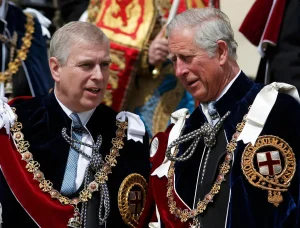
KING CHARLES III STRIPS PRINCE ANDREW OF ROYAL TITLES, WINS PUBLIC BACKING BUT SPARKS CALLS FOR FURTHER ACTION
Agency Report

King Charles III’s historic decision to strip his younger brother, Prince Andrew, of his royal titles and effectively exile him from public life has drawn widespread approval across Britain but also renewed demands for deeper accountability within the monarchy.
The move, announced Thursday, marks the first time since 1919 that a senior royal has been formally divested of their princely status. It follows years of scandal over Andrew’s association with convicted US sex offender Jeffrey Epstein and fresh outrage after new details emerged from the memoir of Epstein’s accuser, Virginia Giuffre.
Giuffre’s posthumously published memoir, which reiterated allegations that she was trafficked to have sex with Andrew three times — including twice at age 17 — reignited public anger and renewed scrutiny of the royal family.
Outside Buckingham Palace, reactions were largely supportive.
“It’s a long time coming. Maybe he should have done it a long time ago but well done for doing it now,” said Pam Williams, an American resident of Britain since 1972.
On BBC’s political debate show Question Time, the studio audience reportedly broke into applause when the news broke.
British tabloids mirrored the national mood, with the Daily Mirror headlining “Finally!” and The Sun calling him “The Andrew formerly known as Prince.”
Prime Minister Keir Starmer’s spokesman said Downing Street “fully supports the decision,” confirming that the Palace had consulted the government before acting.
Andrew, 65, had already been stripped of his military affiliations and public duties in 2022 after paying millions in an out-of-court settlement to Giuffre, though he has consistently denied wrongdoing.
Giuffre’s brother, Sky Roberts, welcomed Charles’s action but said it was insufficient.
“I commend the king… but we need to take it one more step further: he needs to be behind bars,” he told the BBC.
Anti-monarchy group Republic has since directed its legal team to explore whether enough evidence exists for a private prosecution. However, London’s Metropolitan Police have said they will not reopen investigations after a 2021 review.
Royal historian Ed Owens described the situation as the monarchy’s “third most severe crisis” in modern times — after the abdication of Edward VIII in 1936 and the backlash to the royal family’s response to Princess Diana’s 1997 death.
“Charles has been out of other options for some time,” Owens said. “Andrew’s presence within the royal family had become completely untenable.”
The scandal had overshadowed the king’s recent diplomatic engagements including his landmark visit to the Vatican where he was heckled by a protester shouting, “How long have you known about Andrew and Epstein?”
The controversy intensified after revelations that Andrew had paid no rent for decades on his 30-room Windsor mansion, under what critics have called a “secretive and overly generous lease.”
Under the king’s directive, Andrew will now be officially known as Andrew Mountbatten-Windsor and will relinquish his residence at Windsor Castle. He is expected to move to a privately funded lodge on the king’s Sandringham estate in Norfolk though the relocation may take several months.
Broadcaster and royal confidant Jonathan Dimbleby described the development as a virtual banishment.
“Andrew is now effectively banished to Sandringham,” Dimbleby said. “The king will be feeling relief and hope that for him, and for the monarchy, the matter will now fade. Though it won’t, of course, for Andrew.”
Despite his removal from royal titles, Andrew remains eighth in line to the British throne, a position critics argue should now also be reconsidered amid ongoing demands for greater transparency and reform within the monarchy.
